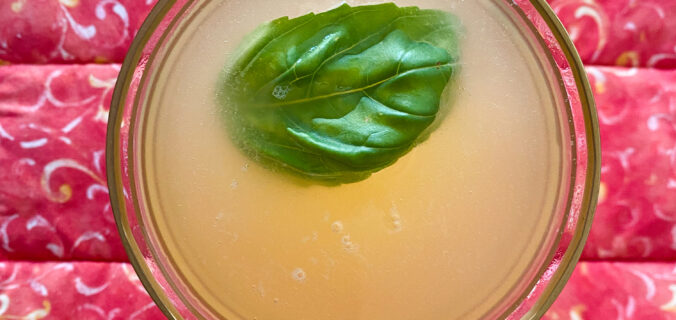Midway through a mostly forgettable 1989 episode of the TV series Columbo, the disheveled but shrewd police detective interviews a bartender who the previous night had served a man who ended up dead—and the woman suspected of murdering him.
The bartender, who has just started a class for a dozen eager would-be mixologists, gives them their first assignment: a Shirley Temple. “Get it right!” he barks. Then he retreats to the bar to talk to Columbo while making a Shirley Temple of his own, complete with pineapple-shaped straw and a Maraschino cherry. “That’s my Shirley Temple,” he says, presenting it to the lieutenant.
“That’s very refreshing!” Columbo coos after giving it a taste. “An interesting Shirley Temple. Touch of dryness, but a light, sweet bouquet. Very nice. You’re a very good bartender, sir.”
The bartender, played by veteran character actor Dave Florek, doesn’t explain what makes his Shirley different. He appears to simply eyeball a couple of glugs of premade mixes (probably grenadine and bar sour) into a glass and top it off with club soda—hardly a formula deserving of Peter Falk’s high praise.
Then again, I’ve never made a Shirley Temple. I should probably learn how. The concoction is considered the quintessential mocktail, both because it contains no alcohol and because it is widely mocked as a kid’s drink. But the ingredients in a Shirley Temple are a natural combination. After all, the drink is basically a Gin Daisy without the gin.
And Columbo’s bartender was right: Every good mixologist should know how to make great alcohol-free cocktails. I have family and friends who don’t drink alcohol, and there are times when even I don’t feel like partaking. (I usually lie down until the feeling goes away.)
Chilled magazine regularly features low- or no-ABV (alcohol by volume) cocktails. Punch, one of the best online bartending resources, offers dozens of nonalcoholic recipes. One restaurant industry consultant listed alcohol-free drinks among the top beverage trends of 2021. As The Washington Post put it, “Hospitality that treats guests who don’t drink—for reasons of health, religion, sobriety or a night’s designated driver-hood—as less worthy of pampering isn’t fully hospitable.” So those of us holding the mixing jars had better add those drinks to our repertoire.
The easiest way to ease off the booze is to use shrubs—vinegar-based syrups that combine fruit, herbs, and sugar; they’re simple to make at home and can replace the pungent bite of alcohol in a cocktail. (Shrubs are outstanding in alcoholic drinks, as well.) Vegetable juices, green tea, nonalcoholic cider, and kombucha are likewise versatile and, used correctly, can create a drink whose complexity rivals that of the most elaborate cocktail.
The growing audience for alcohol-free drinks has also sparked an explosion in zero-proof spirits, one of which, Seedlip, is the foundation for this week’s Sunday Special, a mocktail called Hedge Your Bets. Based in Britain, Seedlip has created a line of distilled, nonalcoholic bases in three flavors—herbal, citrus, and spice—and a whole bunch of recipes in which to use them.
No one will mistake Seedlip for gin. But no one will mistake a Hedge Your Bets for a Shirley Temple, either.
And as Columbo would say, “Just one more thing …”
It’s a mocktail, but that’s no excuse to scrimp on the ingredients. If you use bar mixes or premade fruit juices instead of freshly squeezed, you’ve got it wrong. No matter what Columbo’s bartender says.
Hedge Your Bets
Adapted from Seedlip
1 1/2 ounces Seedlip Spice 94
1 ounce fresh grapefruit juice
1/2 ounce fresh lemon juice
2 bar spoons of fruit preserves (we used peach jam from Oregon Growers)
Basil leaf for garnish
Add liquid ingredients and preserves to a cocktail shaker with ice. Shake vigorously for 20 seconds, then strain into a chilled cocktail glass. Garnish with basil leaf.

